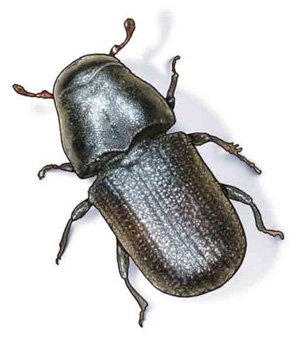Nikiforuk: What the Bark Beetle Taught Me
A six-legged memorandum from the author of the new insect epic, 'Empire of the Beetle.'
![]()

Mountain pine beetle: Fighting it made things worse.
![]()
Mountain pine beetle: Fighting it made things worse.
- Empire of the Beetle
- Greystone Books / David Suzuki Foundation (2011)
They say that bullets don't lie. Nor do bark beetles.
And that was my first lesson in the woods. Who would have thought that something as small as a grain of rice could transform a landscape five times the size of Vancouver Island into a ghost forest, and in the process also make mincemeat out of experts, government and industry?
I didn't believe it at first.
But the celebrated bark beetle logging company has dramatically reshaped the West by killing some 30 billion trees from Alaska to Mexico over the last two decades. This history-changing event, (and the beetle is not finished yet) also serves as an uncomfortable and powerful metaphor for the globe's teetering financial system.
Believe or not, an aging lodgepole forest bears an uncanny resemblance to the world's concentrated banking networks. It has no give, few players and has grown too dense and complicated. It's lost its energy to concentrated bigness and is now ready to collapse. Renewal, no matter how necessary, is rarely a pretty sight in a forest or a banking system. And government bailouts make matters worse.
And that's just one of the surprising lessons that bark beetles taught me. I had no idea that a bullet-shaped creature, normally a rare and inconsequential forest resident, could suddenly burst upon the scene and change everything. This wild animal, which challenges our desires as much as grizzlies, simply caught me by surprise.
Beetling away for 300 million years
For starters, bark beetles outnumber us. There are 7,500 species on the planet. That makes them more numerous than mammals, and their numbers are declining by the year. So when bark beetles go a tear, we need to sit up and pay attention.
Bark beetles have also been pruning and weeding trees for 300 million years. They are the world's original forest managers and tree surgeons. Some species are fierce predators that even have a natural mandate to collapse and renew entire forests. Unlike most so-called forest managers, they actually know what they are doing. Not surprisingly, these highly social animals, which chatter like squirrels inside the bark of trees, don't work in a timeframe that we'll ever appreciate.
Bark beetles don't devastate either. They simply take out drought-stressed and unthrifty trees and renew entire ecosystems the way revolutions chuck out corrupt political parties and despotic leaders.
Nor does this tiny charismatic insect work alone. Every bark beetle is really a biological bus. On the crevices of its hard shell rides a host of friendly and often hostile passengers, including fungi, mites, bacteria, yeasts and nematodes (round worms), which in turn carry more varieties of fungi.
The fungi, all relatives of a kingdom that provide the world with its antibiotics, may even drive the whole beetle/tree system. Without them, the beetles have no nutrition. After they kill a tree, bark beetles also turn it into a temporary fungal garden to feed their young.
Bark beetles also share a number of similarities with human empires. They lie dormant for a long time and then quickly explode across the landscape. Once they've expanded their empire and eaten themselves out of house and home, they retreat and collapse. (But no human empire can re-engineer an entire landscape as quickly as a bark beetle.) They, too, attack in highly coordinated swarms. Watching a thousand beetles hit a pine tree is like watching a medieval army besiege a castle, but with one difference. The tree, a carbon castle, usually falls in a day.
Foolish humans
Just about everything that governments and the logging industry have done to stop the beetle have made the problem worse. In B.C., massive clear cuts ruined watersheds, damaged roads, lessened forest diversity and impoverished communities by high grading non-pine species from the landscape. Government policy that lowered stumpage fees from $25 to 25 cents a cubic meter (allegedly to reduce fire hazards or to salvage beetle kill) ultimately impoverished the owners of the resource (the people of B.C.) and enriched a few corporations.
Instead of using the crisis as an opportunity to restructure a badly concentrated industry, the government continued with business as usual: it bailed out the big guys and let the little guys fail. But smart government (truly an oxymoron these days) would have reshaped the timber industry and its monster tree leases into community-based forests and smaller, more labor-intensive firms that added value to the resource. But that's real beetle proofing, and it never happened.
Nikiforuk: What the Bark Beetle Taught Me: Page 1 of 2



What have we missed? What do you think? We want to know. Comment below. Keep in mind:
Do:
Do not: